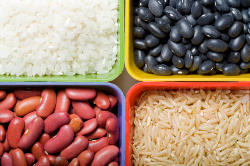How to Make a Vegetarian Diet Well-Balanced and Healthy

Fruits and vegetables are an important part of any balanced diet. But nutrition experts also recommend eating a certain number of servings of meat and dairy products each day. It’s not surprising that many people who are considering becoming vegetarians hesitate because they fear that they will not get adequate nutrition. The truth is that vegetarians can eat balanced diets too. It takes careful planning, but it’s not as difficult as one might imagine. The key to eating a balanced diet as a vegetarian is to know what foods give you the vitamins and nutrients that most people get from animal sources.
Calcium
Calcium is important because it strengthens our bones. Most people associate calcium with milk and cheese, but these are not the only sources of the important mineral. There are many vegetables that contain calcium.
Leafy green vegetables are one of the most popular sources of calcium among vegetarians. Broccoli and beans are also rich in calcium. Soy products provide lots of calcium as well, as do fortified fruit juices.
Lacto and ovo-lacto vegetarians can consume milk and milk products, so it’s easier for them to include calcium in their diets. But vegans can get the calcium they need for strong bones as well.
See: Top 5 Healthy Dark Green Vegetables
Protein
A common myth about vegetarianism is that it is extremely difficult to get enough protein. The fact is that although vegetarians usually eat less protein than those whose diet includes meats, meat-eaters often eat too much protein. Plant proteins can also be healthier, because they do not come with the large amounts of fat and cholesterol that animal proteins sometimes do.
Beans are a great source of protein for vegetarians. Grains, nuts, and seeds are also protein-rich. Even many vegetables, such as corn, provide a large amount of protein.
But a word of warning: plant proteins are what’s called “incomplete proteins” because, on their own, they don’t contain all the essential building blocks of protein (amino acids).
To make sure they’re eating a complete protein, vegetarians should eat a variety of foods that complement each other, protein-wise.
Here’s a list of vegetarian foods that complement each other:
- Grains with legumes (e.g. beans and rice);
- Milk with grains (e.g. milk and cereal)
- Grains with nuts/seeds (e.g. rice with almond slivers);
- Milk with legumes (milk in lentil or pea soup);
- Legumes with nuts/seeds (sunflower seeds and peanuts).
Vitamins
One thing that vegetarians usually get plenty of is vitamins. Fruits and vegetables are loaded with them, and many of these foods have several different vitamins in one delicious package. But there are a few vitamins that vegetarians need to take extra care to include in their diets:
- Vitamin B12 is one important vitamin that is usually obtained through meat, eggs or dairy products. Lacto and ovo-lacto vegetarians do not need to worry about getting enough B12 in their diets. Vegans, on the other hand, might want to consider taking B12 supplements.
- Vitamin D is also often lacking in vegan diets. Those who consume dairy products that are fortified with Vitamin D do not have to worry about it, but strict vegans usually don’t get much of the important nutrient. Two solutions are to get plenty of sunshine, which causes our bodies to create Vitamin D on their own, or to take Vitamin D supplements.
See: Vitamins and Minerals Calculator
Eating a balanced diet is no harder for a vegetarian than it is for anyone else. Getting all of the vitamins and minerals we need requires us to eat a variety of foods, and to make sure those foods have enough of the things we need in them. By educating yourself about which foods have the nutrients that vegetarian diets often lack, and making it a point to include those in your diet, you can be a healthy vegetarian.
Must Read
Top 7 Healthy Fruits & Vegetables
How to Get More Veggies Into Your Diet
